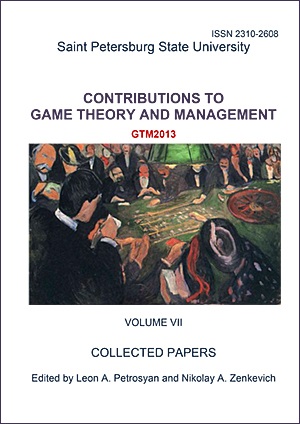Multicriteria Coalitional Model of Decision-making over the Set of Projects with Constant Payoff Matrix in the Noncooperative Game
Abstract
Let N be the set of players and M the set of projects. The multicriteria coalitional model of decision-making over the set of projects is formalized as family of games with different fixed coalitional partitions for each project that required the adoption of a positive or negative decision by each of the players. The players' strategies are decisions about each of the project. The vector-function of payoffs for each player is defined on the set situations in the initial noncooperative game. We reduce the multicriteria noncooperative game to a noncooperative game with scalar payoffs by using the minimax method of multicriteria optimization. Players forms coalitions in order to obtain higher income. Thus, for each project a coalitional game is defined. In each coalitional game it is required to find in some sense optimal solution. Solving successively each of the coalitional games, we get the set of optimal n-tuples for all coalitional games. It is required to find a compromise solution for the choice of a project, i.e. it is required to find a compromise coalitional partition. As an optimality principles are accepted generalized PMS-vector (Grigorieva and Mamkina, 2009; Petrosjan and Mamkina, 2006) and its modifications, and compromise solution.
Keywords:
coalitional game, PMS-vector, compromise solution, multicriteria model
Downloads
References
Downloads
Published
How to Cite
Issue
Section
License
Articles of "Contributions to Game Theory and Management" are open access distributed under the terms of the License Agreement with Saint Petersburg State University, which permits to the authors unrestricted distribution and self-archiving free of charge.




